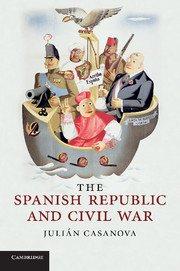Appendix 2 - Political parties and organisations
Published online by Cambridge University Press: 05 June 2012
Summary
Acción Española: A fundamentalist monarchist group, inspired by Acción Francesa.
Acción Nacional (Popular): A Catholic right organisation, founded after the proclamation of the Republic to defend ‘Religion, Family, Order, Labour and Ownership’. It changed its name to Acción Popular in April 1932 and was the forerunner of the CEDA.
Acción Republicana: A left-wing republican group founded by Manuel Azaña in the 1920s, one of the Republic's governing parties during its first two years. In April 1934, it merged with other republican parties to form Izquierda Republicana (IR).
Comunión Tradicionalista: Carlist organisation, monarchist defenders of the Carlist wing, as opposed to the Bourbon supporters, at the time represented by Alfonso XIII.
Confederación Española de Derechas Autónomas (CEDA): A Catholic party set up in February 1933, led by José María Gil Robles. It was the first grass-roots right-wing party in the history of contemporary Spain, and its aim was to defend ‘Christian civilisation’ and fight republican legislation.
Confederación Nacional del Trabajo (CNT): A syndical organisation with anarchist influences, set up in 1910, which stood for direct action and anti-politicism, and which took firm root in the 1930s, particularly in Catalonia.
Esquerra Republicana de Catalunya: Republican left-wing party in Catalonia, led by Francesc Macià and then by Lluís Companys, who led the governments of the Generalitat after the granting of the Statute of Autonomy to Catalonia in September 1932.
- Type
- Chapter
- Information
- The Spanish Republic and Civil War , pp. 344 - 346Publisher: Cambridge University PressPrint publication year: 2010

